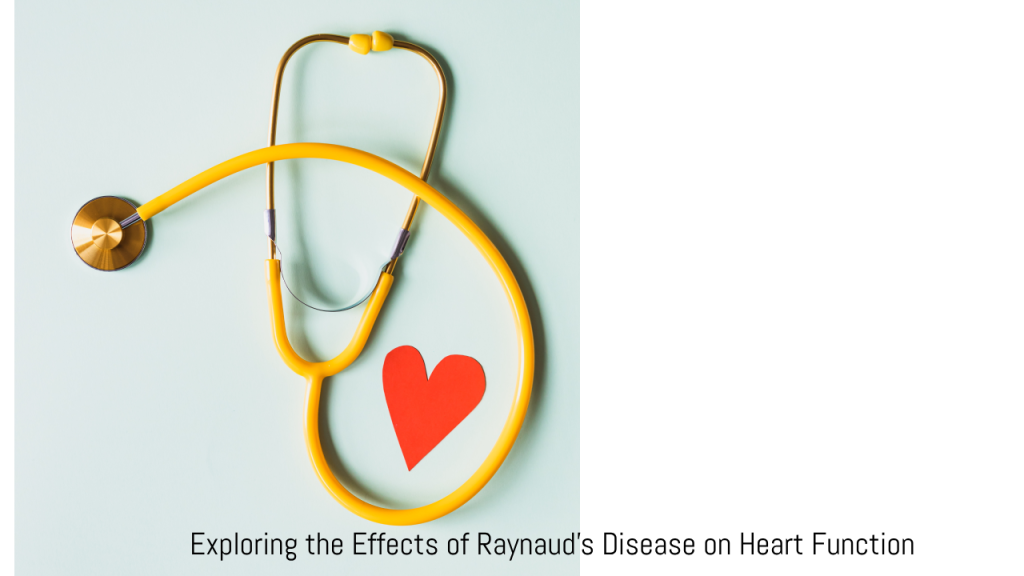Exploring the Effects of Raynaud’s Disease on Heart Function
The Impact of Raynaud’s Disease on Cardiac Health
Introduction Raynaud’s disease is a condition characterized by the constriction of blood vessels, resulting in reduced blood flow and discoloration of extremities, such as fingers and toes. While the primary manifestations of Raynaud’s disease affect the hands and feet, its influence extends to the heart as well. In this article, we delve into the effects of Raynaud’s disease on the cardiovascular system and explore the potential implications for individuals living with this condition.
Understanding Raynaud’s Disease
Raynaud’s disease is a disorder in which blood vessels, primarily in the fingers and toes, overreact to cold temperatures or emotional stress. This exaggerated response leads to vasoconstriction, impeding blood flow to the affected areas. Consequently, the restricted blood circulation causes discoloration, numbness, and a chilling sensation in the affected regions.
The Relationship Between Raynaud’s Disease and Cardiac Health
While Raynaud’s disease predominantly affects the extremities, it can also impact the heart due to underlying vascular abnormalities. The same vasoconstriction that occurs in the fingers and toes can affect the coronary arteries responsible for supplying blood to the heart muscles. This constriction can result in diminished blood flow to the heart, potentially leading to various cardiovascular complications.
Impact on Blood Circulation
In individuals with Raynaud’s disease, the narrowed blood vessels restrict the delivery of oxygen-rich blood to the heart. Insufficient blood flow to the heart can trigger angina, characterized by chest pain or discomfort. Prolonged reduced blood flow may contribute to the development of more severe heart-related conditions like coronary artery disease.
Heightened Risk of Cardiovascular Disease
Research indicates that individuals with Raynaud’s disease may face an increased risk of developing cardiovascular diseases, including heart attacks and strokes. The chronic vasoconstriction disrupts the normal blood flow, raising the likelihood of blood clot formation or plaque buildup in the arteries, thereby increasing the risk of cardiovascular events.
Heart-Related Symptoms in Raynaud’s Disease
When Raynaud’s disease affects the heart, individuals may experience symptoms such as chest pain, shortness of breath, palpitations, and fatigue. It is crucial not to ignore these symptoms as they may indicate an underlying heart condition requiring medical attention.
Diagnosis of Cardiac Complications
If healthcare professionals suspect heart involvement in individuals with Raynaud’s disease, they may conduct various diagnostic tests, including electrocardiograms (ECG/EKG), stress tests, echocardiograms, and coronary angiography. These tests assess heart function, identify abnormalities, and determine the most appropriate treatment plan.
Treatment and Management Approaches
Managing Raynaud’s disease aims to alleviate symptoms, prevent complications, and mitigate heart-related issues. A comprehensive approach may include lifestyle adjustments, medications, and supportive therapies.
Lifestyle Adjustments
Individuals with Raynaud’s disease should prioritize keeping their extremities warm and protected from cold temperatures. Wearing gloves, socks, and layering clothing aids in maintaining adequate blood flow. Avoiding triggers such as stress and exposure to cold is also crucial in symptom management.
Medications for Raynaud’s Disease and Cardiac Well-being
Medical professionals may prescribe medications to manage Raynaud’s disease and its impact on the heart. These may include calcium channel blockers to relax blood vessels, vasodilators to improve blood flow, and medications addressing underlying conditions such as high blood pressure or cholesterol levels.
Seeking Medical Attention
Regular medical check-ups and follow-up appointments are vital for individuals with Raynaud’s disease to monitor their heart health. Any new or worsening symptoms should be promptly reported to a healthcare professional.
Exercise and Raynaud’s Disease
Engaging in regular physical activity is generally beneficial for heart health. However, individuals with Raynaud’s disease should exercise caution and consult their healthcare provider before undertaking strenuous activities. Balancing exercise with warmth and protection of the extremities is essential.
Significance of Stress Management
Stress can trigger Raynaud’s episodes and potentially exacerbate heart-related symptoms. Adopting stress management techniques such as deep breathing exercises, meditation, and engaging in relaxing activities contributes to overall well-being.
Diet’s Role in Heart Health for Raynaud’s Patients
Maintaining a heart-healthy diet is crucial for individuals with Raynaud’s disease. A diet rich in fruits, vegetables, whole grains, lean proteins, and healthy fats supports cardiovascular health. It is advisable to limit the consumption of processed foods, saturated fats, and sodium.
Supportive Therapies
Complementary therapies such as acupuncture, biofeedback, and massage therapy can provide additional support for individuals with Raynaud’s disease. These therapies aim to promote relaxation, enhance blood circulation, and reduce stress levels.
FAQs Q: Is Raynaud’s disease life-threatening? A: Raynaud’s disease itself is not life-threatening. However, if left untreated, it may increase the risk of developing serious cardiovascular complications.
Q: Can stress trigger Raynaud’s disease symptoms? A: Yes, stress can trigger Raynaud’s disease symptoms and potentially exacerbate heart-related symptoms. Stress management techniques are important for individuals with this condition.
Q: Are there any specific exercises recommended for individuals with Raynaud’s disease? A: Engaging in regular physical activity is generally beneficial. However, individuals with Raynaud’s disease should consult their healthcare provider to determine suitable exercise routines.
Q: Can diet play a role in managing Raynaud’s disease and its impact on the heart? A: Yes, maintaining a heart-healthy diet can support overall cardiovascular health, including the management of Raynaud’s disease. Consuming a balanced diet rich in fruits, vegetables, and lean proteins is recommended.
Q: What should I do if I experience chest pain or other heart-related symptoms with Raynaud’s disease? A: If you experience chest pain or other heart-related symptoms, it is important to seek medical attention immediately. These symptoms may indicate an underlying heart condition that requires prompt evaluation and treatment.
